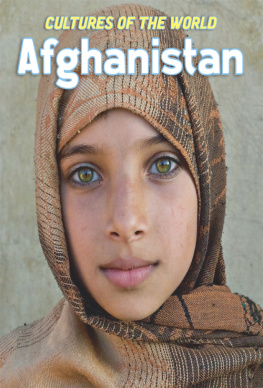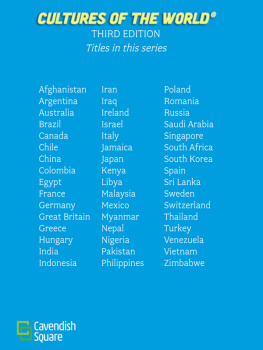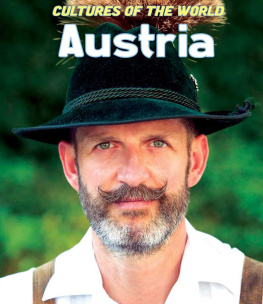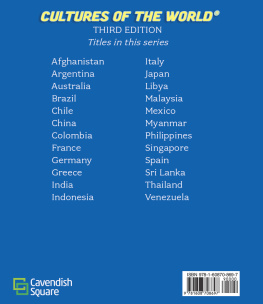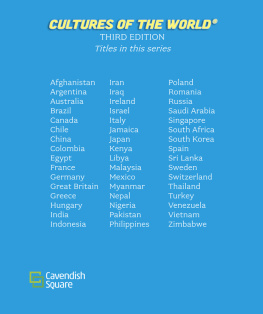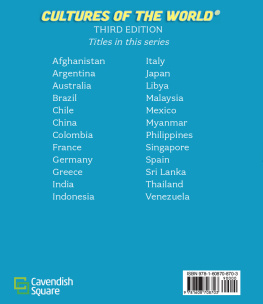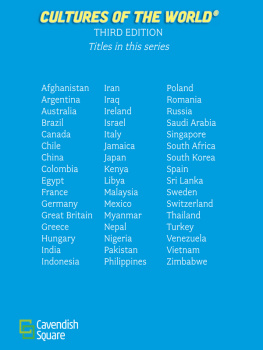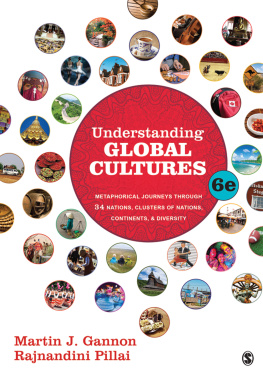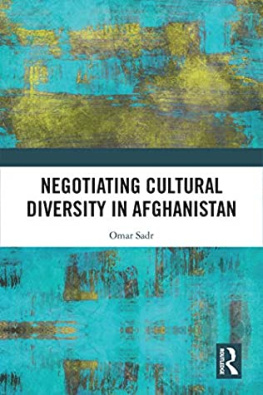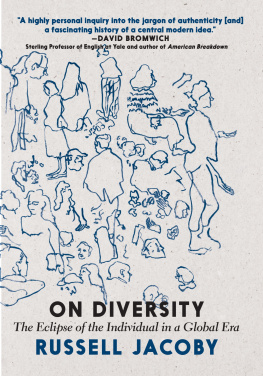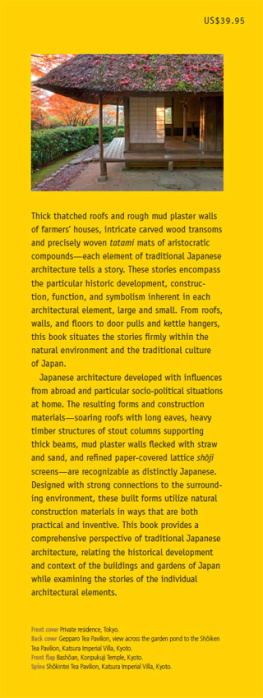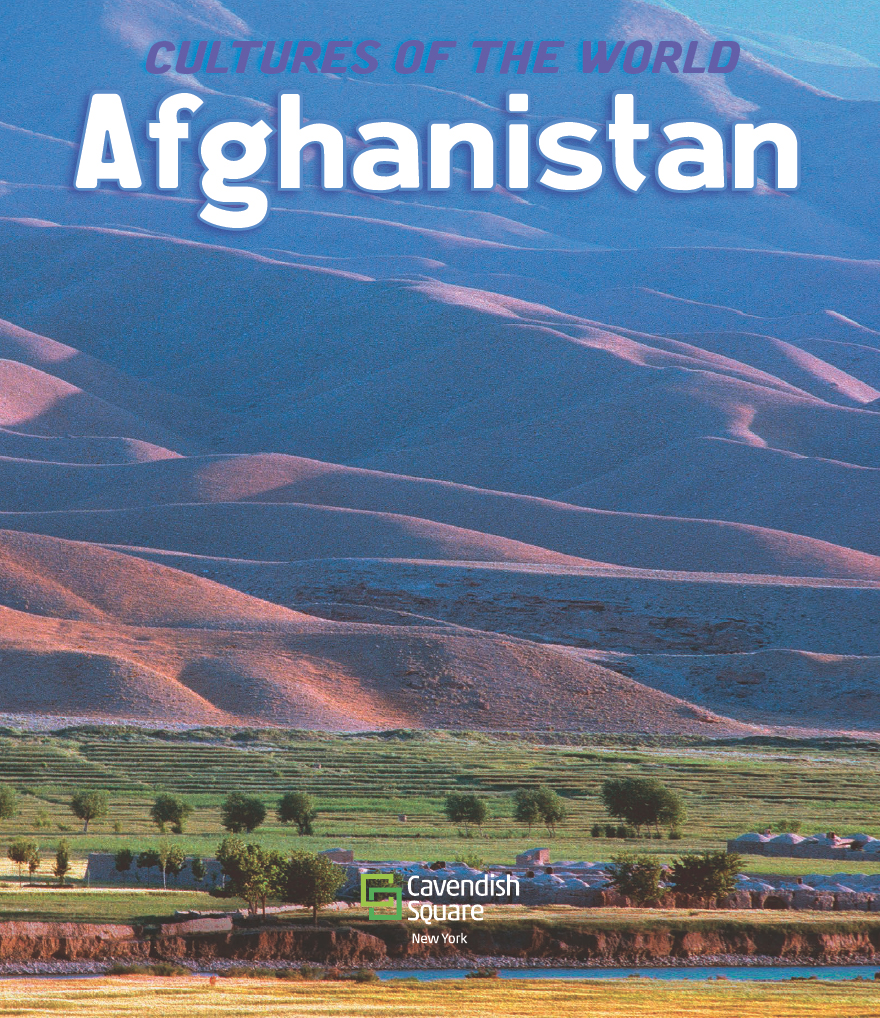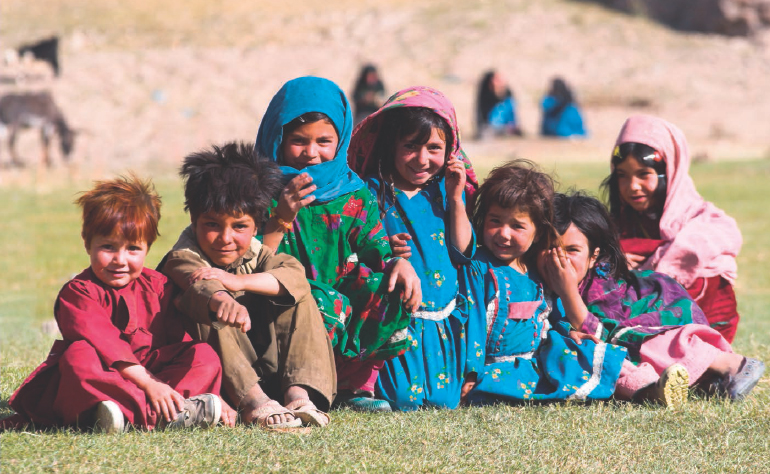Published in 2014 by Cavendish Square Publishing, LLC
303 Park Avenue South, Suite 1247, New York, NY 10010
Third Edition
This publication is published with arrangement with Marshall Cavendish International (Asia) Pte Ltd.
Copyright 2014 Marshall Cavendish International (Asia) Pte Ltd.
All rights reserved. No part of this publication may be reproduced or transmitted in any form or by any means, or stored in any retrieval system of any nature without the prior written permission of Marshall Cavendish International (Asia) Pte Ltd.
Website: cavendishsq.com
Cultures of the World is a registered trademark of Times Publishing Limited.
This publication represents the opinions and views of the author based on his or her personal experience, knowledge, and research. The information in this book serves as a general guide only. The author and publisher have used their best efforts in preparing this book and disclaim liability rising directly or indirectly from the use and application of this book.
CPSIA Compliance Information: Batch #WS13CSQ
All websites were available and accurate when this book was sent to press.
Library of Congress Cataloging-in-Publication Data
Ali, Sharifah Enayat, 1943
Afghanistan / Sharifah Enayat Ali and Josie Elias. 3rd ed.
p. cm. (Cultures of the world)
Includes bibliographical references and index.
Audience: Grades 46.
Summary: Provides comprehensive information on the geography, history, wildlife, governmental structure, economy, cultural diversity, peoples, religion, and culture of AfghanistanProvided by publisher.
ISBN 978-1-60870-866-6 (hardcover) ISBN 978-1-62712-157-6 (paperback) ISBN 978-1-60870-872-7 (ebook)
1. AfghanistanJuvenile literature. I. Elias, Josie. II. Title.
DS351.5.A44 2013
Writers: Sharifah Enayat Ali and Josie Elias
Editors: Deborah Grahame-Smith, Mindy Pang
Copyreader: Tara Tomczyk
Designers: Nancy Sabato, Lynn Chin
Cover picture researcher: Tracey Engel
Picture researcher: Joshua Ang
PICTURE CREDITS
Cover: Alison Wright / Corbis
alt.TYPE / REUTERS:
PRECEDING PAGE
A view of the Herat River in west Afghanistan.
Printed in the United States of America
CONTENTS
AFGHANISTAN TODAY
1.GEOGRAPHY
Topography Climate Flora and fauna Cities
2.HISTORY
Early civilization Achaemenid Empire Greek rule Succession of conquerors Arrival of Islam Ghaznavid dynasty Mongol rule Birth of the Afghan state Arrival of Western powers Moves toward modernization Soviet invasion Civil war The Taliban A new beginning after the Taliban
3.GOVERNMENT
The president The legislative body The Wolesi Jirga The Meshrano Jirga The judicial system Loya Jirga
4.ECONOMY
Agriculture Foreign trade Handicrafts and industry Mining Tourism Hydroelectric power Transportation
5.ENVIRONMENT
Environment in crisis Legacy of war Deforestation Wildlife Pollution
6.AFGHANS
Pashtuns Tajiks Nuristanis Hazaras Uzbeks and other Turkish minorities Nomads Others
7.LIFESTYLE
Life in the villages Nomadic life Urban Afghanistan Changing lifestyle Role of women Family relationships Marriage Children Education Refugees Health care Death
8.RELIGION
The Five Pillars of Islam Shia and Sunni Pre-Islamic beliefs Non-Muslims
9.LANGUAGE
The Indo-European languages Shared languages Script Foreign languages The press in Afghanistan
10.ARTS
Pre-Islamic heritage Islamic heritage Architecture Literature Visual arts Theater and movies
11.LEISURE
Childhood games Kite flying Buzkashi Pahlwani and other sports Music and dancing
12.FESTIVALS
Eid al-FitrEid al-Adha Ashura Mawleed Al-Nabi Nowruz Jeshn Other holidays
13.FOOD
Naan Pilau Kebab Other foods Tea
MAP OF AFGHANISTAN
ABOUT THE ECONOMY
ABOUT THE CULTURE
TIMELINE
GLOSSARY
FOR FURTHER INFORMATION
BIBLIOGRAPHY
INDEX
AFGHANISTAN TODAY
A FGHANISTAN, OR LAND OF THE AFGHANS, A PATCHWORK OF diverse kingdoms, came into existence as a single entity only in the 18th century. Lying at the crossroads between Europe and the Far East, a steady stream of conquerors, adventurers, and soldiers of fortune has arrived there through the narrow passes of the Hindu Kush throughout the centuries.
The Afghans had often been called giant killers. Both Darius I of Persia and Alexander the Great of Macedonia found them to be a formidable foe, as did, much later, the British and the Russians. However, the last two decades of the 20th century, from the Soviet occupation to the overthrow of the severe Taliban regime in 2001, left Afghanistan devastatedits farmlands were ravaged, pastures and roads were riddled with land mines, and cities were ruined.
In December 2001 Hamid Karzai, an ethnic Pashtun and leader of one of the largest tribes in southern Afghanistan, was sworn in as chairman of a six-month interim government. In June 2002 Hamid Karzai was elected as president of the new interim government by the Loya Jirga (law-yah jorhr-GAH) or Grand Assembly. By 2004 rival Afghan factions agreed on a constitution, which finally paved the way for democratic elections. Shortly afterward 23 donor nations pledged a total of $8.2 billion in aid to Afghanistan over three years. However, there is a wide gap between the pledges made and the actual assistance delivered. Between 2002 and 2005 only $3.3 billion was spent, and fewer than $1 billion worth of projects were actually completed. This is the Afghanistan of today, more than 10 years since the end of the civil war and the fall of the Taliban, the majority of the population is still working hard at rebuilding the basic infrastructure of the country, improving health and education, renovating factories, building reliable transport networks, and trying to get the country to the stage where it can be in control of its own security operations and not dependent on foreign aid. Despite new leadership and efforts to rebuild, Afghans still do not live in peace.
A lack of security is one of the countrys biggest problems. Businessmen and women have been randomly kidnapped and held for ransom by gangs. The level of violence has increased and opium cultivation is still a primary source of income for many Afghan farmers, particularly in the southern parts of Afghanistan where the Taliban still have influence. The number of drug addicts has increased to around 1 million, out of a population of approximately 31 million. Opium production, which increased for many years following the fall of the Taliban, has begun to show a decline as more farmers are encouraged to grow crops such as wheat, fruit, and vegetables. Most of the opium is grown in areas where security is worst.
Foreign troops are stationed in Afghanistan with the intention of helping it to overcome its problem with national security. The tactics of the Taliban have changed. They now disrupt national security by planting improvised explosive devices (IEDs) and carrying out suicide attacks, often injuring or killing Afghan civilians. The United States and the international community are spending billions of dollars and sending relief workers into this war-torn country to help with projects as diverse as reopening power plants to planting trees, clearing land mines, and digging wells. Progress has also been made in training and educating Afghan police and military personnel. The number of officers and noncommissioned officers in the police force increased from 42,500 in 2009 to 61,850 in 2011. The same applies to the army. Between 2009 and 2011 the number of officers and noncommissioned officers grew from 40,900 to 66,800. Training and education are essential in developing leaders but experience is also essential and that requires time. Afghans need to be able to be in control of the security of their own country in order for the foreign troop withdrawal to take place successfully without the country reverting to civil war and unrest.

